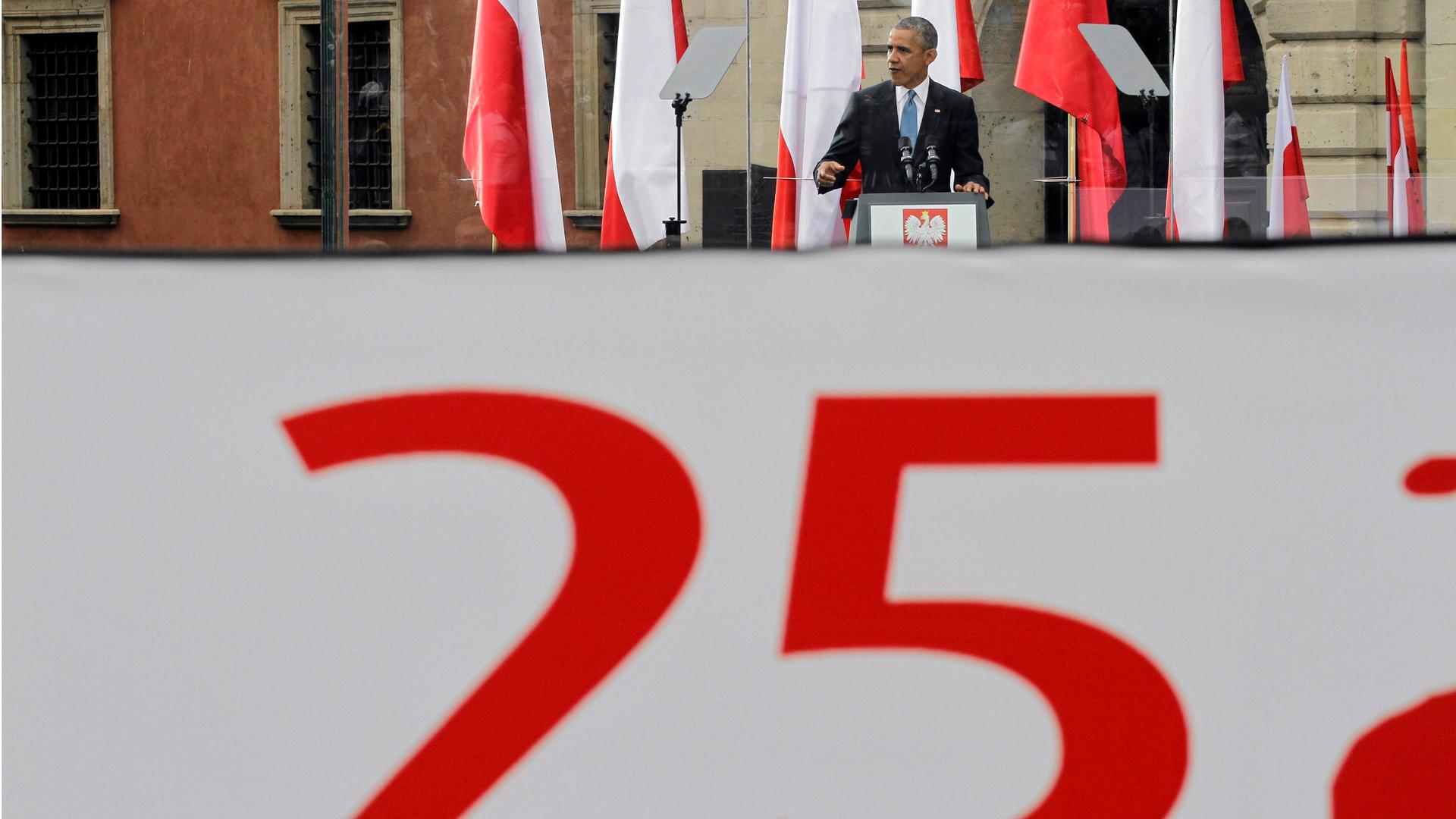President Obama’s visit to Poland highlights a relationship that isn’t as warm as it used to be
US President Barack Obama speaks during a ceremony marking the “Freedom Day” anniversary in Warsaw’s Castle Square June 4, 2014. Obama’s visit to Poland coincides with the “Freedom Day” anniversary, marking the holding of the country’s first partially-free elections 25 years ago.
President Barack Obama is in Poland this week to celebrate the nation's 25 years of political independence from the Soviet Union. But the Poland he arrives in is much cooler about its American ally than was the case a quarter century ago.
Polish analysts quoted in advance of Obama's arrival in Warsaw say Poles are much more concerned about Europe than they are America, and Poles are less likely to rely on US promises of support in the Ukraine crisis. Is there a subtle but growing divergence of interests between Poland and the United States?
Anne Applebaum, foreign affairs columnist for the Washington Post, says Poland's relationship with the US is going through a natural readjustment.
"The Poles get tens of millions of euros every year from Europe for development in the form of trade, and their relationship with the US is a little bit more distant — both naturally and geographically," Applebaum says. "The Poles are waiting for a more concrete commitment from the United States to the security of the region."
While symbolic gestures are appreciated, Applebaum says Poland is looking for something more substantive.
"I think people would really like to see a permanent base of US troops in the region," she says. "It doesn't have to be Poland, it could be Estonia or it could be Romania. [Poles want] some indication that NATO, and particularly the North American piece of NATO, understands that the calculus of geopolitics has changed."
Applebaum says the Polish desire for an American military commitment comes partly because Poland provided support to the US during the Iraq and Afghanistan wars. In Afghanistan, Poland committed troops to the US effort, and it actually ran a sector in Iraq.
"Other nations in the region also felt that they've supported the US several times in the last couple of decades, and they would like to know what that means — is there a return for it, does the United States still feel committed to peace in Europe?" Applebaum says.
Though the purpose of Obama's trip is to celebrate Poland and commemorate D-Day, Applebaum says this visit does set up some expectations for the future.
"I don't think there's a negative tone to the meeting, but I do think now and over the next few months, people are expecting an American and a higher-level European commitment to this region," she says. "We now have a different set of security issues in Europe, and I think Europeans and particularly central Europeans would like the U.S. to shift its policy to reflect that."
This interview first appeared on PRI's The Takeaway, a public media show that invites you to be a part of the American conversation.
President Barack Obama is in Poland this week to celebrate the nation's 25 years of political independence from the Soviet Union. But the Poland he arrives in is much cooler about its American ally than was the case a quarter century ago.
Polish analysts quoted in advance of Obama's arrival in Warsaw say Poles are much more concerned about Europe than they are America, and Poles are less likely to rely on US promises of support in the Ukraine crisis. Is there a subtle but growing divergence of interests between Poland and the United States?
Anne Applebaum, foreign affairs columnist for the Washington Post, says Poland's relationship with the US is going through a natural readjustment.
"The Poles get tens of millions of euros every year from Europe for development in the form of trade, and their relationship with the US is a little bit more distant — both naturally and geographically," Applebaum says. "The Poles are waiting for a more concrete commitment from the United States to the security of the region."
While symbolic gestures are appreciated, Applebaum says Poland is looking for something more substantive.
"I think people would really like to see a permanent base of US troops in the region," she says. "It doesn't have to be Poland, it could be Estonia or it could be Romania. [Poles want] some indication that NATO, and particularly the North American piece of NATO, understands that the calculus of geopolitics has changed."
Applebaum says the Polish desire for an American military commitment comes partly because Poland provided support to the US during the Iraq and Afghanistan wars. In Afghanistan, Poland committed troops to the US effort, and it actually ran a sector in Iraq.
"Other nations in the region also felt that they've supported the US several times in the last couple of decades, and they would like to know what that means — is there a return for it, does the United States still feel committed to peace in Europe?" Applebaum says.
Though the purpose of Obama's trip is to celebrate Poland and commemorate D-Day, Applebaum says this visit does set up some expectations for the future.
"I don't think there's a negative tone to the meeting, but I do think now and over the next few months, people are expecting an American and a higher-level European commitment to this region," she says. "We now have a different set of security issues in Europe, and I think Europeans and particularly central Europeans would like the U.S. to shift its policy to reflect that."
This interview first appeared on PRI's The Takeaway, a public media show that invites you to be a part of the American conversation.
